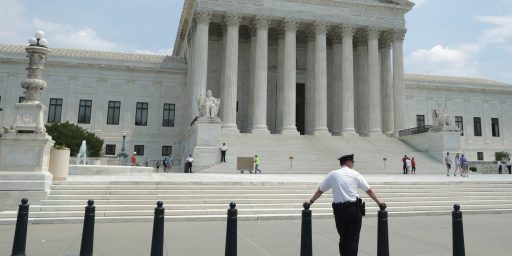Fillibustering Bill Pryor
Mobile Register columnist Quin Hillyer has a piece in today’s WSJ explaining Alabamian’s befuddlement that Bill Pryor is considered sufficiently controversial to fillibuster.
The liberal Anniston Star, for instance, in the same editorial that urges filibusters against most of President Bush’s nominees, writes that “Pryor, who possesses a brilliant legal mind, cannot be so easily dismissed. . . . Pryor has been proven capable of setting aside his ideology when it matters most. . . . [He] helped shut down [Alabama Chief Justice Roy Moore’s Ten Commandments] sideshow and, in the process, displayed personal courage. That alone ought to convince Democrats currently blocking a vote on Pryor to give him a chance.”
Why do Alabamians so strongly back Judge Pryor? Because they’ve seen him in action defending Democratic lawmakers against Republican lawsuits, defying the Republican governor (Fob James) who appointed him, and spending countless hours establishing a youth mentorship program through the attorney general’s office. They know him, up close, as a man of integrity and compassion.
National critics have gone to prodigious lengths to muddy that home-state record. Unfairly so. Consider that critics have accused Judge Pryor of being insensitive to women because he successfully argued against one small portion of the Violence Against Women Act. But Judge Pryor’s constitutional point was virtually incontrovertible, namely that rape doesn’t qualify as “interstate commerce.” His goal was to keep authority for prosecuting rapes in state courts, where (in Alabama at least) the juries are likely to be harder on rapists than elsewhere. Meanwhile, he has been praised throughout Alabama by groups that aid victims of domestic violence. Mobile’s Penelope House women’s shelter even named him to its Law Enforcement Hall of Fame.
As I’ve noted previously, I’ve met Pryor a couple of times and found him quite amiable. He’s a Southern politician and wears his religion on his sleeve, but he’s no radical. Brandy Ayers, the longtime editor of the Anniston Star, is indeed quite liberal by Alabama standards (although only slightly left-of-center nationally) but fairminded.
The fact that the likes of Pryor are being fillibustered belies the argument that President Bush is sending up crazy ideologues who must be stopped by the most drastic means available. Cato’s Doug Bandow has an interesting solution in yesterday’s LAT: changing the Constitution to eliminate lifetime tenure for judges.
The best means of responding to these concerns [judges becoming too infirm, out-of-touch, and unaccountable] is to appoint judges to fixed terms rather than for life. Ten or 12 years would allow extended service while ensuring turnover.
The advantages of such a step would be many. First, judicial nominations no longer would become political Armageddon. Supreme Court appointments would always be important, but there would be less incentive to vilify and filibuster nominees. After all, the new justice would serve only one term. Moreover, term limits would ensure a steady transformation of the court’s membership. An enfeebled justice could not hang on in an attempt to outlast a president. New members at regular intervals would encourage intellectual as well as physical rejuvenation of the court. Most important, fixed terms would improve judicial accountability. Judges still would be independent, largely insulated from attack. However, elective officials could eventually reassert control without doing violence to the judicial institution. Yet it still would not be easy, and the process would allow time for ephemeral popular passions to subside.
Judicial independence is important, but so is judicial accountability. Appointing Supreme Court justices to fixed terms would balance the two competing principles.
It would also end the practice of judges hanging on past the time when even they want to retire in hopes that a president of their party comes to power.
I’m not a huge fan of amending the Constitution to solve every little problem. Still, the bitterness over judicial appointments has been ongoing now for twenty years and shows no signs of abating. It may be time to consider this option.
Update (1144): Dodd Harris argues, not unreasonably, that this is fixing the wrong problem:
Judicial nominations have not become political Armageddon because judges have lifetime tenure; that’s always been the case and the fractiousness is a rather recent phenomenon. They have become political Argameddon because the power of the Federal government has metasticized far beyond its proper size and scope.
Given that this growth has had no electoral consequences (voters hate big government except when they have a problem they want solved) and the courts surely aren’t going to reverse the trend, though, I’m not sure how to fix the larger problem.






The answer to your question about my post is easy, James: More judges like Bill Pryor – with lifetime tenure. 🙂
And don’t forget that y’all can get daily updates on the Pryor renomination over at my blog, Southern Appeal.
(slinks back over to corner in shame after giving shameless plug) 🙂
Obviously, we’d like to have more judges like Bill Pryor with lifetime tenure. But judges have been a big part of the metasticizing federal government. That’s why an elective solution — subjecting federal judges to retention referenda — is superior to fixed or lifetime terms. The elections themselves would lead to more sober judging; judges like Bill Pryor would be easily re-elected; and even if they won, judges like Anthony Kennedy might learn something. Term-limited judges, on the other hand, will know when the end is near and might want to go out in a blaze of egalitarian glory.
History is littered with Republican-appointed judges who turned out to be activists: Brennan (Eisenhower); Harry Blackmun (Nixon); John Paul Stevens (Ford); Anthony Kennedy (Reagan); David Souter (Bush I). I’ll bet you that of the seven apppointees the Democrats are filibustering, at least three would turn out to be liberal on the court. We need an emergency escape clause to remedy that situation.
Visit Vote for Judges for further argument.